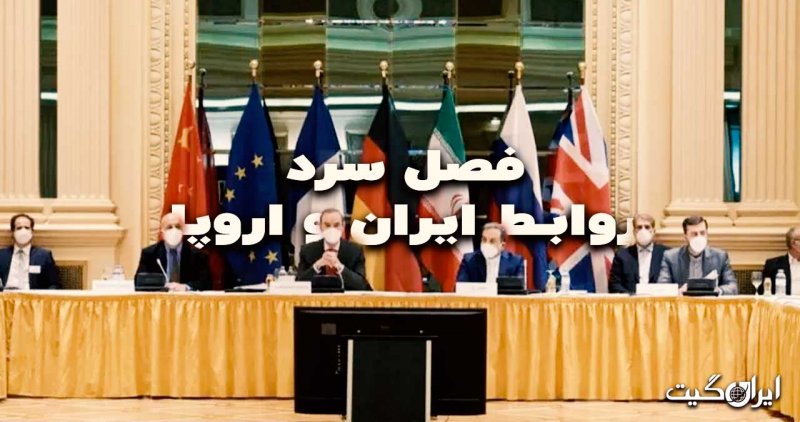The Cold Season of Iran-Europe Relations
The cold season of Iran-Europe relations, according to Iran Gate, has been affected by recent protests in our country, leading to new developments in Iran’s foreign relations. In this context, the West, particularly European countries, have adopted harsh stances against Iran due to what they describe as violations of human rights and democracy in our country, influenced by pressures from their public opinion.
As a result, the European Union has imposed various sanctions on Iran several times, allegedly in support of human rights. Leaders of major European countries like Germany, the United Kingdom, and France have also explicitly taken strong positions against our country.
Olaf Scholz, the Chancellor of Germany, and the country’s Foreign Minister have adopted aggressive stances against our country. Therefore, some observers and analysts believe that Europe, by continuing its current path, is practically defining its relations with Iran in a framework of no return. This issue suggests an escalation of tensions and disputes between Iran and Europe in the possibly near future, a matter recently evidenced in a harsh statement by the European troika against Iran during a meeting of the International Atomic Energy Agency’s Board of Governors.
The Importance of Germany
In 2013, the British magazine The Economist wrote that Germany is reluctant to have hegemony but should take on a more leading role. However, Erik Bonse, a reporter for the German newspaper Taz, writes that Europe essentially means Germany. Bonse points to Germany’s significant influence in European institutions such as the Commission, the Council of Ministers, and the European Parliament.
From January to October 2022, Germany exported goods worth 12 billion euros to Iran, while its imports from Iran were about 260 million euros. Thus, Germany is Iran’s largest trading partner in the European Union. The Frankfurter Allgemeine Zeitung published an article about Iran-Germany trade relations, stating that Germany is the most important trading partner of the Islamic Republic regime.
This newspaper, while mentioning that very harsh news is coming from Iran, wrote that last Monday, Iranian authorities announced the execution of the first death sentence related to the protests by the country’s citizens. Mohsen Shekari, 23, was accused of injuring a member of the Basij militia and blocking a street in Tehran. Today, Monday, December 12, the judiciary of the Islamic Republic also announced the public execution of another Iranian. It is likely that more protesters will be executed. During the current protests, the European Union has imposed sanctions on individuals who have committed serious human rights violations, and on Monday, December 12, these sanctions were even intensified.
Internal Crisis and Its Consequences
The internal situation in Iran has also had widespread reflections outside our country and naturally has had a significant impact on public opinion, especially in Western countries, leading Western governments to feel the need to respond appropriately to developments in Iran. This issue, particularly considering the widespread international coverage of Iran’s news from a human rights perspective, has taken on serious dimensions and aspects.
For years, Europeans have considered themselves the global hub for human rights, and in this framework, they cannot miss the current opportunity regarding Iran’s issues. From this perspective, we see a range of well-known European leaders, such as the German Chancellor, the country’s Foreign Minister, as well as French and British officials, taking stances on this matter.
The Role of the JCPOA and Moscow
The second point that should be considered as a catalyst for Europe’s recent extremism against Iran is the delay in reviving the JCPOA. It seems that Europeans have lost hope of reaching a nuclear agreement with Tehran sooner than the Americans. The Americans are still keen on reaching an agreement with Iran despite knowing that achieving such an agreement has become more challenging, especially with the rise of American Republicans in the House of Representatives.
Nevertheless, they are still eager for an agreement because, on the one hand, they are concerned about Iran’s further enrichment, and on the other hand, considering the short time until the 2024 U.S. presidential election, which, with internal party competitions and other related processes, becomes even shorter. The Biden administration and the Democrats want to present an agreement with Iran as an achievement for themselves. They are not going to say that we reached this agreement and it’s good,
but rather they specifically highlight that through the agreement with Iran, they prevented Iran from becoming nuclear and acquiring what is referred to as nuclear weapons. Therefore, the Americans are still interested in an agreement with Iran, but the Europeans have given up on this. When we look at the positions of senior European leaders and politicians, we realize that they emphasize that Iran does not intend to sign an agreement.
Meanwhile, the third catalyst for Europe’s recent harsh positions regarding Iran are the various claims they make about Iran’s military cooperation with Russia within the framework of the Ukraine war. Europeans, who are highly sensitive about the Ukraine issue, perceive Tehran’s actions within the equation of this war as a significant threat to themselves. They have paid substantial costs in the context of the Ukraine war and felt they had brought Putin to a point of weakness.
However, what Europe calls Iran’s entry into the equation of the Ukraine war has practically altered many equations, and specifically, Iranian drones have been able to impact the course of this war. Therefore, with their recent positions against Iran, Europe is trying to halt Tehran’s cooperation with Moscow by any means possible. The three mentioned factors seem to best explain the reasons and motivations behind Europe’s recent harsh positions against Iran.

